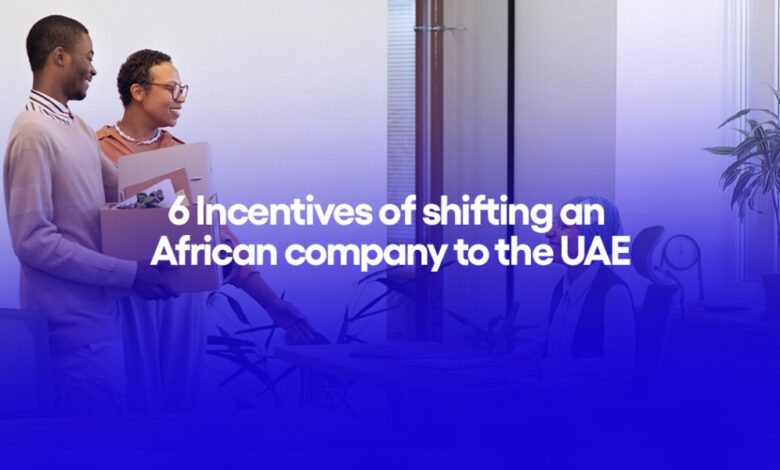6 Incentives of shifting an African company to the UAE

Not merely a geographical stopover, the UAE become a strategic launchpad for international entrepreneurs. In recent years, the United Arab Emirates has got prominence as a dynamic corridor for Africa’s global trade ambitions. Therefore, shifting an African company to the UAE is the right move for many investors.
The UAE is fueled by world-class infrastructure, fiscal incentives, and a legal system containing both Francophone and Common Law traditions. Its favorable economic policies make it an open corporate destination for running business operations for both Emirati and expatriate investors. So, it makes moving an African firm to the UAE a compelling proposition.
Between 2019 and 2023, the UAE invested approximately USD 110 billion in Africa. It includes USD 72 billion earmarked for renewable energy, a scale of engagement that outpaces traditional players like the UK, France, or China. This massive capital deployment underscores Dubai’s role as a nexus for sustainable infrastructure, logistics, and financial connectivity. It enables African entrepreneurs in the UAE to plug into strategic economic corridors stretching across continents.
Six advantages of African corporate relocation to the UAE
These are some of the benefits of African business relocation to the UAE.
Geostrategic Connectivity & Infrastructure Leadership
Dubai’s prime location, straddling Asia, Europe, and Africa, offers businesses unmatched access to international markets. Its multi-modal logistics network includes advanced airports, seaports, and integrated transport systems. Companies like DP World and Abu Dhabi Ports have heavily invested in port infrastructure across Africa, anchoring Dubai’s presence in critical maritime corridors.
Moreover, the UAE is positioning itself as a knowledge exporter. In May 2025, UAE and five African nations signed MOUs on railway and infrastructure collaborations under Etihad Rail’s initiative, transferring expertise, logistics best practices, and development know-how. These moves reinforce the emirate’s commitment to being a credible strategic partner and logistics innovator for African businesses in the UAE and beyond.
Legal & Regulatory Flexibility
The UAE’s dual legal architecture is a standout advantage: the onshore system aligns with civil-law norms familiar to Francophone African countries. Whereas, free zone jurisdictions like DIFC (Dubai International Financial Centre) and ADGM (Abu Dhabi Global Market) operate under English common law. Thus, they facilitate global corporate structuring and dispute resolution.
In particular, DIFC stands out as a well-established financial free zone, offering 100% foreign ownership, and 50-year tax holidays. It has a separate court system, upheld by the English common law. In 2022, DIFC recorded a 19% year-on-year rise in non-financial firms, with total international and family-business participants topping 3,000.
Business Promotion & Trade Facilitation
The Dubai Chamber has channeled over AED 100 million to promote UAE–Africa business ties. It runs four African representative offices, organizes trade missions, and launched the Africa Gateway app. Between 2019 and 2024, non-oil trade with Africa soared to AED 700 billion, with 10,000 African businesses joining its network, bringing the total to over 17,000 members.
By end-2024, 26,910 African companies were active members of Dubai Chamber, growing more than 29% annually. In Q1 2025 alone, 2,292 new African companies joined, reflecting growing confidence in Dubai as a strategic hub for African companies in the UAE. Accordingly, it means African investors have a great opportunity across the multiple business sectors of the UAE.
Trade Agreements & Multilateral Engagement
Dubai’s global trade vision extends via Comprehensive Economic Partnership Agreements (CEPAs) with nations like Kenya, Morocco, and Mauritius. These agreements lower trade barriers, standardize cooperation, and open investment pathways. Additionally, in 2025, the UAE aligned with South Africa’s G20 presidency to advance reforms favoring inclusive trade and integration into AfCFTA and global supply chains.
Capital Access & Sustainable Investment
Beyond capital inflows, the UAE offers clean energy financing. For example, the Etihad 7 program pledges to deliver renewable energy solutions to 100 million Africans by 2035, supported by its USD 72 billion commitment. Sovereign and private players are active too: UAE firms acquired a 51% stake in Mopani Copper Mines (Zambia) for USD 1.1 billion. This holds promise for relocating an African company to the UAE, especially for firms in energy, mining, or infrastructure sectors.
Soft Power, Diplomacy & Global Integration
Dubai blends soft power with commerce: hosting events like The Africa Debate, a global investor forum drawing hundreds of delegates focused on energy, ICT, and transformation. Its engagement in G20 forums further signals a commitment to equitable integration of African economies into global trade architecture. All these efforts deepen trust and broaden pathways for African entrepreneurs in the UAE to scale internationally.
Challenges in African business relocation to the UAE
African entrepreneurs and investors can face these hardships during corporate relocation to the UAE.
Bridging Legal and Cultural Gaps
Even with favorable frameworks, setting up in the UAE requires careful navigation of legal, linguistic, and cultural nuances. Companies can benefit from tapping in-region chambers, Dubai Chamber’s advisory services, and trade missions. These tools help align cultural norms and build meaningful business networks that catalyze the success of African firms in the UAE.
Addressing Ethical & Environmental Concerns
While UAE investments scale rapidly, they have sparked concerns, ranging from environmental delays in renewable projects to allegations of gold smuggling and mining opacity. To protect brand integrity, African businesses in the UAE must emphasize responsible sourcing. Also, they must maintain transparency, and community engagement, especially in sensitive sectors like resources or agribusiness.
Financial & Project Risk Management
Large-scale projects, like Kenya’s Standard Gauge Railway, have found renewed momentum through UAE financing after stalled Chinese projects. It includes a $1.5 billion commercial loan and feasibility support. Such models show that shifting an African company to the UAE doesn’t just mean relocation. Rather, it also includes access to diversified funding and risk-sharing structures.
Local Talent & Ecosystem Development
Recruiting skilled local managers, regulators, and logistics professionals may pose challenges. Bridging this gap requires investing in training and forming partnerships with UAE-based service providers or free-zone entities. Hence, the availability of the skillful workforce means African firms can easily expand their corporate operations.
Positioning for Long-Term Value
To maximize impact, African firms in the UAE should align offerings with UAE-led regional development priorities. For instance, green energy, transport infrastructure, fintech, and digital logistics, especially as integration with AfCFTA evolves. These all things combine to position African firms for more success in the UAE, the broader MENA region, and globally.
Conclusion
The UAE’s emergence as Africa’s premier business hub is no accident. It reflects a multifaceted strategy: world-class infrastructure, layered legal systems, trade facilitation, mega-infrastructure financing, and soft power diplomacy. For African businesses in the UAE, this presents strategic opportunity to access capital, innovation hubs, global networks, and cutting-edge sectors.
To succeed, African firms must anticipate challenges, ethical standards, compliance, and talent acquisition; to embrace the UAE’s business ecosystem. By doing so, shifting an African company to the UAE can unlock both commercial scale and sustainable growth. It is not only for the investors, but the future for Africa as well.
Take your next entrepreneurial drive for more business growth internationally. Transfer your African firm to the UAE to make the most of the corporate potential there. Simplify your relocation with the help of professional consultants at KWS Middle East right now.


